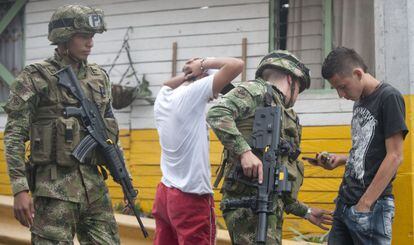Petty crime a major challenge in Colombia
Cellphone thefts, often involving violence, are number one form of robbery in Bogotá


In Bogotá, there is nothing odd about someone hanging up on you with the excuse that they are out on the street. It has nothing to do with ambient noise or bad reception. Rather, people are scared that someone will pull the cellphone right out of their hand.
This has happened twice in three months to Diego Medina, a 40-year-old bank employee. In fact, he still had several instalments left to pay on the second phone, which was stolen 10 days ago.
It happened near his home in a middle-class neighborhood at 4.30pm. “Five people showed up on two bicycles; one of them blocked my path and punched me, another one threw me to the ground. I tried to resist, but they kicked me and one of them put a revolver to my chest. I didn’t try anything after that,” he says.
Nobody came to his rescue, and nobody called the police. Neither did he, as a matter of fact. “It’s a waste of time, it doesn’t help at all.”
We remain a tremendously violent society” María Victoria Llorente, security analyst
Cellphone theft is the most common form of robbery in the Colombian capital, and has become a cause of great social alarm after several people were killed trying to fight off thieves. El Tiempo, the country’s biggest newspaper, has an entire section exclusively devoted to cellphone theft, while the candidates in this year’s presidential elections have talked about it in their programs.
Although the police claim that theft has gone down 18 percent, the issue has become symbolic of more general anxieties over citizen safety. Phone theft represents a great concern in a country where the overall level of violence has dropped considerably after the government busted all the major drug cartels, demobilized the paramilitary and began peace talks with the FARC guerrillas.
But the homicide rate is still 30.8 for every 100,000 inhabitants, which is higher than in Brazil or Mexico.
The war and the conflict with the FARC is now a faraway issue for city dwellers, compared with the daily problem of street safety.
“Until the late 1990s, there were major criminal organizations in Colombia that controlled the entire drug trafficking chain, such as Pablo Escobar’s Medellín cartel,” explains Ariel Ávila, a security expert at the Peace and Reconciliation Foundation. “But as these cartels fell and Mexico became the main headquarters for drug trafficking, the business broke up into highly specialized gangs that practice extortion, small-scale drug trafficking, cellphone theft and so on in the cities. Those businesses are now decentralized, but not anarchical.”
In Bogotá, a city of eight million people with no subway system, most theft occurs on the Transmilenio, a network of articulated city buses.
“I always zip up my pockets when I walk in and place my handbag in front of me,” explains Paula, an 18-year-old sociology student, standing near a downtown bus station. Tomás, who is with her, has already been assaulted three times at knife point in the five years he has been living in the capital.
“Before going out to exercise I plan my route depending on the time, and I don’t stop to talk to strangers who ask me a question, as I did at first,” he says.
María Victoria Llorente, director of the Ideas for Peace Foundation, says that “even though objectively there has been no increase in citizen insecurity, what distinguishes Colombia from other countries when it comes to things like cellphone theft is the use of force. We remain a tremendously violent society.”
“We are dealing with a regular crime problem, but we have a police force that focused its entire elite and resources on fighting the drug traffickers and the guerrillas, and it was very efficient at that,” she continues. “Now we need to demilitarize it.” The new challenges have changed, at least in the cities.










































